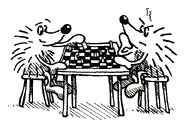 Diese Seite gibt es leider noch nicht auf Deutsch. Diese Seite gibt es leider noch nicht auf Deutsch. |
|
Hello Mü-Fans
T his page is thought to collect some additional available informations about
Mü ;. If anyone has s.th. to contribute, please contact me
(  info@doris-frank.de )!
info@doris-frank.de )! There are currently the following sections:

There have been a few Mü tournaments known to me: Three at the Essen games fair 1996, the Erlangen Müsterschaft and three at the 1997, 1998 and 1999 Gathering of Friends (see somewhere in the  Gamecabinet ).
Gamecabinet ).
Müsterschaft 2009 Results
Go to the
Spielertage Result page .
The "ever lasting" list of Müsters: | Year | Tournament winner |
|---|
| 1997 | Ralf Lehmkuhl |
| 1998 | Stephan Gudra |
| 1999 | Thomas Magenheim-Hörmann |
| 2000 | Gabi Thieme |
| 2001 | Ralf Lehmkuhl |
| 2002 | Ralf Lehmkuhl |
| 2003 | Eckehard R. |
| 2004 | Ralf Lehmkuhl |
| 2005 | Michael Radziej |
| 2006 | Regula Rupp |
| 2007 | Thomas Straubinger |
| 2008 | Eckehard R. |
| 2009 | Thomas Straubinger |
| 2010 | Gerd Siemering |
Gathering Results
There where also Mü-Tournaments being played at Alan Moons annual Gathering of Friends. The winners so far:
| Year | Tournament winner |
|---|
| 1997 | Dave Sidore |
| 1998 | Peter Sarrett |
| 1999 | Jacqui Bankler |
Anyone who likes to organize Mü tournaments is welcomed to ask me for my experiences. Anyone who has own experiences is welcomed to contact me too. EMAIL:  info@doris-frank.de .
info@doris-frank.de .

Caution: This is not a answers section, it's section of questions!
Mü has been out for some years now. Several thousand people all over the globe played Mü so far, and many of them are probably very sophisticated players/card players.
Though we are the designers of the game, there are many open questions to us: E.g. are there any bidding systems coming? Or, what makes Mü different?
I once expected these and many other questions can stimulate a kind of discussion. I had a discussion forum on the net, but it died nearly empty. There have been few discussions on Mü in rec.games.board, but more about the game in general than about the tactical details. Due to the low traffic I can do that discussion by hand ...
E.g. one of those discussions in the Internet was about Mü or Bridge. Someone felt that there are to many trumps in the game, that bidding is to chaotic and needs conventions and that it should be possible to play solo against all other players. Brian Bankler suggested the "next Mü" which was playable with a bridge deck and didn't allow to suits as trumps.
Actually Mü was never meant to be an alternative to Bridge, it is just, that we tried to get a game, which keeps from the bit Bridge we know, what we like and eliminates what we dislike :-) And this is alone a matter of my taste.
Here is another contribution from Richard Heli
| |
Hi!
I have also sometimes wanted to be able to play solo. I wonder if you
might consider an alternate way for the chief to choose a partner? So
far the only way is to name the other player to be partner. Another way
might be for the chief to name a card which is to be his partner.
Whichever player holds the named card is the secret partner of the Chief. This
card must be a unique card, i.e. not a 1 or a 7. If the Chief himself
holds this card, he is secretly playing solo. If the Vice is holding this
card, then the Chief is also playing solo. Naming a face-up card is
uninteresting. There should be a bonus for winning solo -- perhaps a 1 column
shift?
|
One of the design goals was that bidding conventions should easyly appear during play and there is therefore no need to memorize such a system. The following is a quotation from a mail between Richard Heli and myself, his words are the ones at zero and double indent. My words have single indentation. Richard has also his very own suggestion for a Ursuppe rule
| |
>thanks for your mail, I've been waiting for this moment
>for over two years. In fact I had a discussion forum
Happy I could oblige. :)
>installed on my homepage, which died away with just
>2 posts in 5 month or so.
>
>Would you allow me to put your mail (with your name
>of course) on the Mue-Page? I'm to curious what
Sure.
>conventions are arround. Maybe you manage to stimulate
>the discussion???
>
>> If one is strong in a suit and wishes to lead a game
>> in it, one generally plays a strong card in that suit
>> such as the 5 or 6 or possibly an 8.
>
>Why not a nine? To nine or not, seems to be one
>of "the" questions. I tend to show my nines as long
There seems to be an instinctive desire not to reveal the 9,
because perhaps it gives too much information.
>as I don't have to avoid to become Vice. The nine
>gives my partner at least one good lead and sometimes
>allows us to gain a (scoring) 8 instead of the nine.
Good point.
>> If one wishes to be a "complementary partner", one
>> usually plays a small card of the same suit.
>
>In fact I had one round where a players regularly
>asked for the eight of his colour by showing his
>7 and 9.
>
>> A lead of 7 usually implies that one wishes to lead
>> a game in which 7's are trump. Similar for 1's.
>
>Well I tend to assume suit as long as I don't see
>a second card of the same rank.
>
>> If one wishes to lead a numbered trump other than 1 or
>> 7, one plays this type of card twice.
>
>see above.
>
>> After the first, or in the last above case, second card,
>> additional cards are generally any low card of no importance
>> as it is already assumed that all understand the intent of
>> the bidder and it is not desireable to give away any further
>> information. In this way bidding will go up to 5, 6, 7, etc.
>> cards.
>
>Why not high cards. When I show a very low card I'm waiting
Our idea is "high card" means you are strong in that suit, "low card"
means you are not as strong as you like and would like a show of help.
>for the nine or eight to appear in that colour! Anyway
>your group seems to bid considerably higher than most
>German groups do!
Nevertheless the Chief usually wins. We bid up because we don't
want to miss our maximum bonus and because we want to make it difficult
for the other side to win.
>> If a player for some reason finds the others not seeming to
>> understand the meaning of his bid, he will sometimes make a
>> late card bid which matches the original card, in color or
>> rank as is appropriate, and, I have seen, actually play that
>> card to the left of the others whereas the other cards have
>> been gradually played left to right. In this way the player
>> seems to be saying that he wants to actually communicate more
>> information, not simply increase the bid.
>
>Sometimes this fails.
>
>> If a game appears to be developing such that one trump will
>> be a number and another will be a suit, owners of the card(s)
>> which are of both this rank and suit, i.e. the 'supertrumps',
>> will sometimes play them in the hopes of thus being chosen
>> the partner.
>
>If I have a reasonable but not superior hand I always
>try to please the bosses. I think Partner is the best
>position in the game anyway.
|
Any  suggestions ?
suggestions ?
Here is a snippet from
 Aaron D. Fuegi
Aaron D. Fuegi , who is not satisfied with the endgame scoring of Mü towards the final:
| |
Doris & Frank,
Firstly, it was great to meet both of you at the Gathering :)
This may not influence your games but I send it to you so that you
might suggest it to (other) people who find problems with Mu's endgame.
Our group, who play it a Lot, were at the point where people were doing totally
outrageous things in the endgame, like 4 of 5 players trying to have a bid
be made so that a player at 196 points didn't get a 5 point bonus for the
bid being missed and thus won. I was at the point of being almost unwilling
to play Mu with this group of people any more so tried to come up with a
few solutions to the endgame. The solutions I came up with were:
1) Don't keep score/play to an infinite score. Unfortunately people want to
win so this wasn't going to be acceptable to some.
2) Play a set number of hands. Better, but there is still an endgame problem,
just a bit different.
3) End the game at a random point. This is what we went with and it has been
a BIG improvement for us. People now pay much less attention to the score and
just play. The idea was stolen from a bunch of other games like Lowenherz
and details of how we currently play are below. Note that game length and
randomness level can easily be adjusted by just changing the numbers and
die-rolling pattern.
Up until someone gets 150 points, you just play normally.
As of the point someone gets 150 points, at the end of each hand the next
dealer rolls a die. In the first round, if a 6 is rolled the game ends
immediately. After the second round a 5 or 6 ends the game, etc... A 1
never ends the game even after 6 rounds of rolling.
|
And here is my personal variation on this, quoted from another mail
| |
>I understand your objections to the game end. Do
>you think I can put your contribution to my internet
>site? I see the point from the randomized game end
>and I have observed it working in many games, e.g.
>Loewenherz. I'd rather draw a card than roling a die
>btw. But this is easily adjusted, like: After a game
>shuffle and draw a card, if any player exceeds 110+10 times
>the number of the card drawn, the game is over otherwise
>reshuffle, deal and proceed. You could also take
>160 plus 5 ties the card drawn and adjust to the range
>you'd prefer and the game length you want to have...
|
Richard Heli has a
 own page with his Mü variations
own page with his Mü variations .



 Gamecabinet ).
Gamecabinet ).![]() info@doris-frank.de .
info@doris-frank.de .  Caution: This is not a answers section, it's section of questions!
Caution: This is not a answers section, it's section of questions! ![]() suggestions ?
suggestions ? own page with his Mü variations .
own page with his Mü variations .